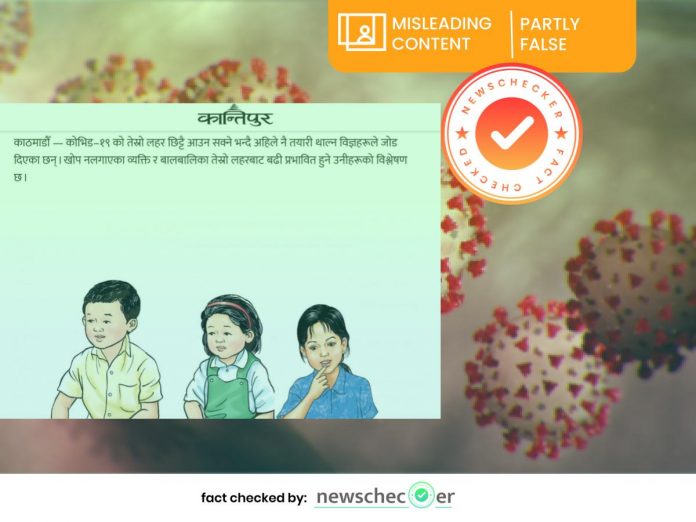As health experts warn of the Third Wave of Covid that could hit India, Nepal and other countries in the region, concerns are also being raised about its possible impact on children. Will children be at higher risk?
Media reports, quoting pediatricians at Kanti Children’s Hospital, have claimed that the Third Wave could pose a ‘higher risk for children’.

The Principal Scientific Advisor to Government of India, Dr Vijay Raghavan predicted that Third Wave is “inevitable given the high levels of circulating virus”. Exact time when the Third Wave would occur is not very clear, but concerns remain.

If the Third Wave hits India, experts fear that it would eventually impact Nepal, too.
Nepal remains particularly vulnerable to an epidemic affecting India as both countries share a porous border. In addition, hundreds of thousands of Nepalis live and work in India and keep travelling to and fro freely and frequently.
With the Second Wave on the wane, thousands of Nepali migrant workers are heading back to India in search of livelihood. This has sparked fears of further spread of the coronavirus in the event of a third wave hitting Nepal’s southern neighbour.
Will children be disproportionately affected?
In light of concerns about a potential third wave of covid-19 infections, expected as early as coming Autumn, it is now being claimed that children could be disproportionately affected than adults.
On May 18, one of Nepal’s most prominent national dailies, Kantipur, reported children are indeed at higher risk of getting infected and could be vulnerable to having more serious symptoms. The report quoted experts urging the government to take necessary steps to protect children from Covid-related ailments.
The Ministry of Health and Population reacted by urging hospitals on 4 June to prepare 20% of beds in all hospitals for children in anticipation.
Health-related news portal swasthyakhabar.com ran a news report on the Ministry’s notice to government hospitals.
Fact Check / Verification
Daily Covid cases in Nepal have been on the decline since mid-June. On July 22, the Ministry of Health and Population announced that the daily spike in new infections was less than 3,000 (out of nearly 17,000 tests carried out), with 18* Covid deaths. Two months ago, the number of new covid cases reported daily was nearly 9000.
Risk of the Third Wave
Speaking to Newschecker, Dr Sher Bahadur Pun, Clinical Research Chief, Shukraraj Tropical and Infectious Diseases Hospital in Kathmandu said “the Third Wave will depend largely on how the virus mutates in the coming days.”
He said that it is difficult to say whether a new variant will be as dangerous as feared and compliance with covid protocols by citizens will play a huge role.
The Alpha variant of Sars-Cov-2 was responsible for the First Wave that hit Nepal in 2020, while the second wave is attributed to the more infectious Delta variant of the coronavirus. Detection of “Delta Plus” mutations have added concerns.
Are children at ‘higher risk’?
During the First wave, Nepal registered over 21,000 cases & 38 deaths in the under 18 age group. However, no conclusive scientific evidence exists yet to substantiate claims that children will be disproportionately affected in the future.
Global medical experts, including those in neighbouring India, agree on the need to follow Covid protocols such as SMS (Social Distancing, masking and sanitising) and getting vaccinated to control the spread of the deadly coronavirus and protect children and adults alike.

Dr Pun disagrees with claims that the Third Wave might affect children disproportionately. “I don’t think the virus will select only younger people and attack them. It can easily transfer and attack people of all age groups,” he said in response to Newscheker’s enquiries.
The Kantipur Daily highlighted concerns by pediatricians in Kathmandu over children being more vulnerable to Covid in the Third Wave. However, writing in Setopati Digital Newspaper, Pediatric Immunologist Dr Dharmagat Bhattarai cited hospital data since the pandemic started and said that only 1-2% of infected children had required intensive care treatment and clarified that there is no scientific evidence to conclude that Covid will make kids seriously or chronically ill.

Conclusion:
Media reports claiming that the Third Wave of coronavirus outbreak could pose a ‘higher risk for children’ lack scientific evidence.
Result: False.
Our Sources:
Webmd: https://www.webmd.com/lung/covid-19-delta-variant-what-to-know
If you would like us to fact check a claim, give feedback or lodge a complaint, email us at [email protected] You can also visit the Contact Us page and fill the form.



